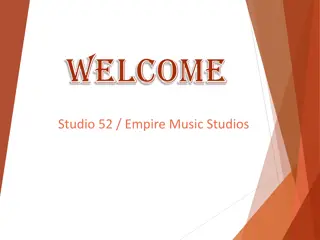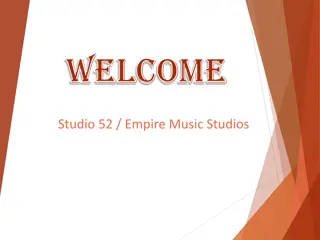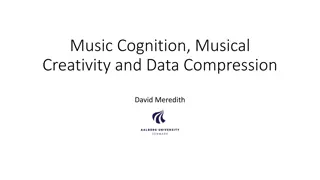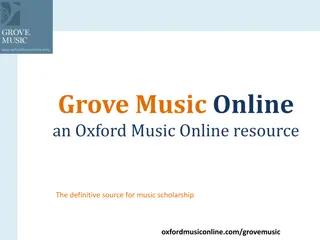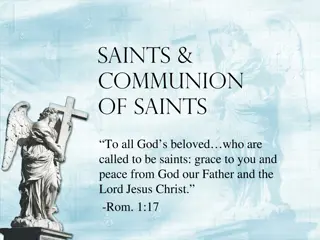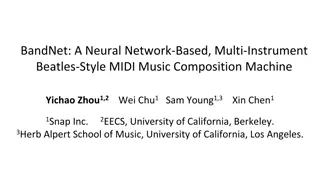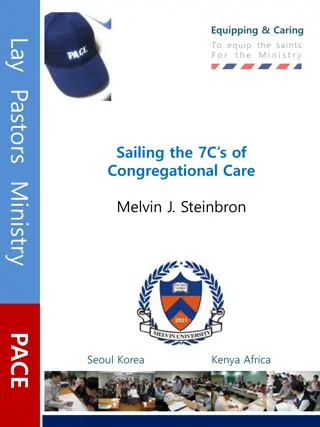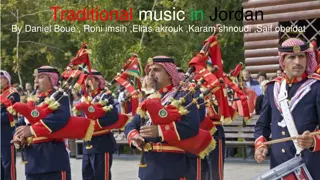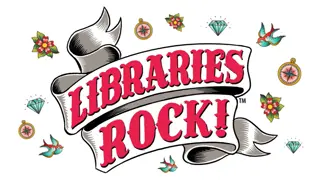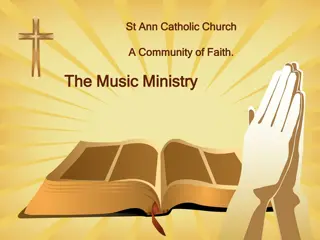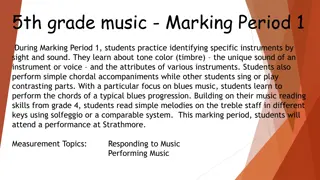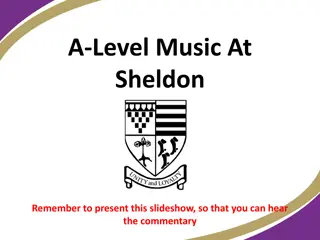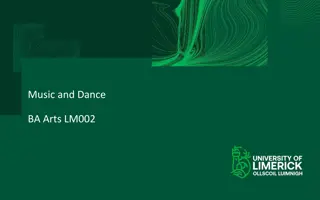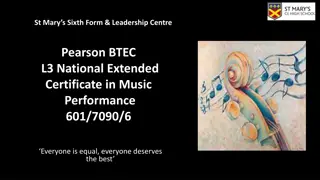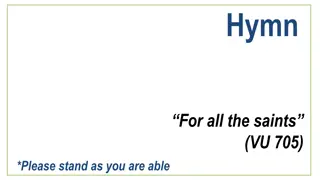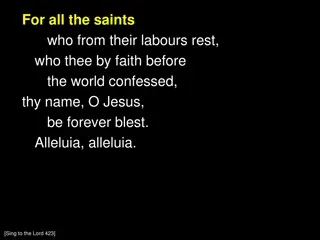Equipping the Saints for Ministry Through Music
This content delves into the power of music in ministry, drawing inspiration from Acts 16:23-26 where Paul and Silas, despite hardships, found solace in prayer and hymns. It explores the essence of saints, the facets of ministry, the significance of music, and the integration of music into ministry. Reflecting on the scriptural foundations of belief, salvation, faith, and works, it emphasizes serving God and mankind, proclaiming salvation, and staying connected to God through music.
Download Presentation

Please find below an Image/Link to download the presentation.
The content on the website is provided AS IS for your information and personal use only. It may not be sold, licensed, or shared on other websites without obtaining consent from the author.If you encounter any issues during the download, it is possible that the publisher has removed the file from their server.
You are allowed to download the files provided on this website for personal or commercial use, subject to the condition that they are used lawfully. All files are the property of their respective owners.
The content on the website is provided AS IS for your information and personal use only. It may not be sold, licensed, or shared on other websites without obtaining consent from the author.
E N D
Presentation Transcript
Equipping the Saints for Ministry: Music, The Believer s Weapon Yaw Sekyi-Baidoo
Introduction: Acts 16: 23 -26 22The crowd joined in the attack against Paul and Silas, and the magistrates ordered that they be stripped and beaten with rods. 23And after striking them with many blows, they threw them into prison and ordered the jailer to guard them securely. 24 On receiving this order, he placed them in the inner cell and fastened their feet in the stocks. 25About midnight Paul and Silas were praying and singing hymns to God, and the other prisoners were listening to them. 26 Suddenly a strong earthquake shook the foundations of the prison. At once all the doors flew open and everyone s chains came loose. 27When the jailer woke up and saw the prison doors open, he drew his sword and was about to kill himself, presuming that the prisoners had escaped. 28But Paul called out in a loud voice, Do not harm yourself! We are all here!
Our Plan Who are the saints? What is the Ministry? What is music? Which aspects are important to us? How do we organise music to take its place in the ministry? What should we do going forward? Excerpts from my compositions
Who are the saints? - Two Sides of Saintship 1. Belief and Salvation - John 3: 16- 17 16For God so loved the world that He gave His one and only Son, that everyone who believes in Him shall not perish but have eternal life. 17For God did not send His Son into the world to condemn the world, but to save the world through Him. 2. Faith and Works James 2: 18- 22 18But someone will say, You have faith, and I have works. Show me your faith without [a]your works, and I will show you my faith by [b]my works. 19You believe that there is one God. You do well. Even the demons believe and tremble! 21Was not Abraham our father justified by works when he offered Isaac his son on the altar? 22Do you see that faith was working together with his works, and by works faith was made [d]perfect?
What is Ministry? What is Ministry? M IN ISTE R to be inferior, to serve: See yourself as a w eak, w orthless one before the w holly other A cknow ledge your dependence and the dependability and greatness of G od as the source of your life. Join w ith other servants to glorify, adore and thank H im Serve H im D o H is biddings - -L ive at peace w ith all persons -P roclaim H is salvation and grace to the w orld
Aspects of Ministry B ut the actual w ork of the m inistry -service to G od and m ankind can be seen in different stages and form s: o Staying connected to G od The principal direction of congregational singing is to the L ord (P s. 96:1). M usic is m ade first of all to the L ord and only secondarily to each other. M usic should com m unicate and express a sense of aw e and w onder in the presence of G od; it should lead our thoughts tow ard G od rather than tow ard ourselves o Strengthening of our faith heart and m ind, our hands, voice and our feet o Stepping into the w orld lifting the fallen and seeking the lost
Basis for Idea of Emotionality in Music Basis for Idea of Emotionality in Music
What is Music? M usic is the language of the spirit. It opens the secret of life bringing peace, abolishing strife. K ahlil G ibran M usic is the literature of the heart; it com m ences w here speech ends. -A lphonse de L am artine M usic is the art w hich is m ost nigh to tears and m em ory. O scar W ilde M usic expresses feeling and thought, w ithout language; it w as below and before speech, and it is above and beyond all w ords. -R obert G . Ingersoll M usic, once adm itted to the soul, becom es a sort of spirit, and never dies. E dw ard B ulw arL ytton M usic is the divine w ay to tell beautiful, poetic things to the heart.P ablo C asals M usic expresses that w hich cannot be put into w ords and that w hich cannot rem ain silent. Victor H ugo
Functions of Music in Ministry M usic and W orship and P raise etc M usic and P rayer M usic and the invocation of the spirit of G od M usic and the expression of faith M usic and doctrine C atechism etc M usic and the affirm ation and storage of thought and doctrine M usic and E vangelism
Music in the Contemporary Orthodox Church o The current organisation music especially in the orthodox churches seems to concern itself more with the church entity the ecclesia and its identity and liturgies rather than on the three main objects of Christian ministry the Lord, the saint and the lost o We seem more to be interested in translations and collections, boasting of which achievements we made in this aspect of religious experience in thought, rather than in ensuring that they become a keen aspect of our fellowship with God and with man o Little attempts are made to ensure that the congregation understand and that they keep the doctrine and the message of God as carried in the hymns etc
Aspects of Meaning o In fewer instances do preachers refer to the hymns chosen for the day in order to synchronisethem with the other aspects of the church worship the prayer, the praise and the sermon. We may sing songs that carry praise, but the praise is not in the content value of the songs but in the message and emotions in our hearts and minds even when not sung out! o Hymns have become more literacy that devotional, and many a time our children do not understand the hymns, and in fact hymn singing, knowledge and understanding is weak even among the clergy and even in our older generations: o There is often the idea that the ministry of preaching and prayer is more important that the ministry of music, so whilst churches have time to train and orient preachers, we take musicians as the incidental parasitical ministry
Often no corporate nor societal plan about the grow th, know ledge and use of m usic as a m inistry, as a tool for m inistry W e look at the m usicians rather that the w ork they ve been com m issioned to do. The provision of m usical instrum ents is often just because it w ill help our liturgical purposes M ost church leadership don t care m uch about the m usic m inistry -the m usical groups and about their ow n role as m em bers of the m usic m inistry There s little tim e for doctrinal and artistic training. W e take w hatever is there looking m ore for the skill than for the doctrinal or devotional underpinning!
SO. o Let s have a plan for music as a ministry o Let s get a collection of hymns that represents our thinking, melody etc o Let s make our hymn singing devotional not literate, mechanical singing that singing is organised to involve your mind and heart and is directed at the point of evangelism o Let s train musicians in doctrine and devotion and care about their growth o Let s love your singing groups o Let the church learn music and learn to understand and pray and preach through music o Let s prepare songs for specially and fit for primary evangelism o Let s evaluate our music ministry - whether it is serving the
Agya Onyame nayemyie d]]so; {w] h[ ma y[n akwan nyina muo Nti fa w as[m nyina hy[ Ne nsa; N ayemyie d]]so. N ayemyie kata y[n b]ne so, N ayemyie na ma y[n nhyira Nti fa w as[m nyina hy[ Ne nsa; N ayemyie d]]so. Mmusuo pii ne asan nyina mu, Amane bebree a onua, y[afa mu; N adom nkotoo na ay[ y[n mmoa Nayemyie d]]so. S[ wo te ase a, ne emfiri w aho]den, Na emmfi nnepa a onua w ay[ koraa Faky[faky[ mm]br]hu Yesu N ayemyie d]]so
Nyame Tse Ase Enyigyes[m k[se na ]tse d[ iyi: H[n dzimafo Nyame tsease o. Nhyira nka h[n hen tseasefo W] anwanwa d] a }dze d] h[n daa. Nyame tse ase o, Hallelujah! }dze N adom no hw[ h[n so daa daa }ma h[n daa edziban, }y[ h[n ehiadze nyina Hallelujah, Nyame tse ase o, daa. H[n enyidado nyina w] Jesus mu, }no na nhyira nyina fir Noo; }pa h[n esian nye mbusu, }no na }ma yedzi nkunyim daa. Jesus dze No bogyaa atsew h[n ho, }da ho dze h[n b]n fir h[n. Agyedzifo, hom nsom Nyame, Hom nsom Nyame a onnyi ewie n daa
Aseda Y[ Wodze Aseda nyina y[ Wodze, Jesus, me botantsim, Ayeyi nyina wodze, Jesus, M akoky[m nye m abank[se nye Wo. Onyamei, dza Ay[ i d]]so o, W adom tsim h] daa nyina Aseda nyina y[ Wodze Jesus. Y[b[ka dza Ay[ akyer[ aman, Jesus, y[b]b] Wodzin daa daa M akoky[m nye m abank[se nye Woo
Aseda Nyina Mbr[ metse I, Wonko na W ay[, Jesus, W ayemyie so. Dza mow] I Wonko na W ay[, Jesus, M asedandwom nyina, Nyamei, Wodze o. {y[ Wo na w amma y[anwu o, Nkunyimdzifo Nwanwanyie Y[b]tow ndwomfofor daa daa ama Woo Y[b[ka dza Ay[ akyer[ aman, Jesus, y[b]b] Wodzin daa daa M akoky[m nye m abank[se nye Woo
Hallelujah, Nyame! Hallelujah, Nyame, Woy[ }hen ampa! W ahendzi b] adze nyinara do, Me Nyamei Y[b]som Woo, Nyame ei, Yehyira Woo daadaa Nyame dzi hen daa Hallelujah! Ndzemba nyina ka d[ Woy[ }hen ampa Ama h[n nso y[ay[ adehye. Y[b]som Woo, Nyame ei, Yehyira Woo daadaa Nyame dzi hen daa Hallelujah! Sor a b]fo mpempem atwa woho ahyia W]tow ndwom yi W ay[w daa, Me Nyamei W]koto s]re Wo, Tumfo Enyimnyam hen, Wo a W ahendzi remb] adze dao!
Hallelujah, Nyame W ahendzi mbra, Nyame, Ma W ahendzi no mbra! Ma kr]kr]ny[ nye d] ngye asaase, Me Nyamei Fa y[abrab] ndomum, ma y[ny[ Wodze koraa Wiadze yi mu nye Wo nky[n w] sor! Ndzemba nyina ka d[ Woy[ }hen ampa Ama h[n nso y[ay[ adehye. Y[b]som Woo, Nyame ei, Yehyira Woo daadaa Nyame dzi hen daa Hallelujah!


